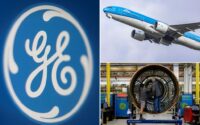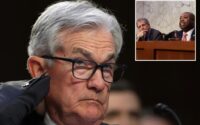Recession fears rise as Fed eyes another interest rate hike
Investors are increasingly worried that the Federal Reserve will steer the US economy into a major recession – even as policymakers meet Tuesday to consider voting on a seventh straight interest rate hike.
The Fed is widely expected to enact a half-percentage point interest rate hike at the meeting’s conclusion on Wednesday. Fed Chair Jerome Powell has signaled ongoing rate increases are necessary to ensure inflation returns to normal – though the hikes will occur at a slower pace than the supercharged clip seen throughout the year.
The central bank’s critics say another rate hike, even of the smaller variety, would effectively dash remaining hopes for an economic “soft landing” amid signs of a cooling labor market and slowing growth.
“The Fed’s efforts have already pushed the U.S. economy into recession,” said Danielle DiMartino Booth, CEO and chief strategist of Quill Intelligence. “The challenge they now face, as sticky housing inflation keeps broader inflation pressures high, is making sure that their rate hikes don’t cause a global financial crisis.”
Members of the Federal Open Market Committee will make their decision on the heels of the latest Consumer Price Index data from November, which is set for release on Tuesday and could have a major impact on the central bank’s course.

Investors are pricing in a 75% probability that the Fed will hike interest rates by half a percentage point, or 50 basis points. A half-point hike would mark a slowdown for the central bank, which has hiked by three-quarters of a point at four straight meetings through November — to reach its current level of 4%
Powell and Treasury Secretary Janet Yellen, who were perennially optimistic about “a soft landing” throughout the year, have begun to acknowledge the heightened risk of a slowdown. In a Sunday interview with “60 Minutes,” Yellen admitted to seeing a “risk of a recession,” though one wasn’t “necessary to bring inflation down.”
Concerns about the Fed’s plan has prompted volatility in the stock markets. Stocks indexes had a good day Monday — with the Dow gaining more than 450 points — but were coming off their their worst weeks since September. The broad-based S&P 500 closed at 3,990 on Monday, down from nearly 4,800 at the start of the year.


The uncertain economic outlook has only added anxiety among investors, who will be watching Powell closely for clear signs of the Fed’s long-term strategy.
“The real focus in Wednesday’s FOMC developments won’t necessarily be the magnitude of the rate hike itself, but which Jerome Powell shows up at the podium during the press conference – a kind, gentle and scripted dove prepared to pivot, or a hawkish Powell who isn’t afraid to jolt markets,” Booth said.
Among the Fed’s most prominent naysayers is billionaire Elon Musk, who recently warned that an economic recession “will be greatly amplified” if policymakers hike rates this week.
Elsewhere, JPMorgan Chase CEO Jamie Dimon shared a similar view during a recent appearance on CNBC. The bank boss warned that the Fed’s ongoing slate of interest rate hikes “well might derail the economy and cause this mild to hard recession people are talking about.”

While inflation has showed signs of moderation in recent months, the Fed’s hikes have hammered other parts of the economy – especially the US housing market, where prices and sales volume have plunged as mortgage rates skyrocketed.
Signs of disagreement have begun to emerge among the Fed’s governors. Doves such Philadelphia Fed President Patrick Harker have urged a more methodical approach to gauge how hikes have already impacted the economy.
Meanwhile, more hawkish members, such as Kansas City Fed President Esther George, warn economic pain is necessary to ensure inflation falls back to its acceptable target range.

“I don’t know how you bring this level of inflation down without having some real slowing—and maybe we even have contraction in the economy to get there, George told the Wall Street Journal last month.
In a late November speech, Powell further spooked investors by indicating the Fed could hike its benchmark rate “somewhat higher than thought” when policymakers last provided a forecast in September.
“It is likely that restoring price stability will require holding policy at a restrictive level for some time. History cautions strongly against prematurely loosening policy,” Powell said at the time.
At the time, Fed officials saw the rate hitting a peak of 4.6%. However, the market now expects rates hike to end when the range hits 5% to 5.25%, according to CME Group data.


